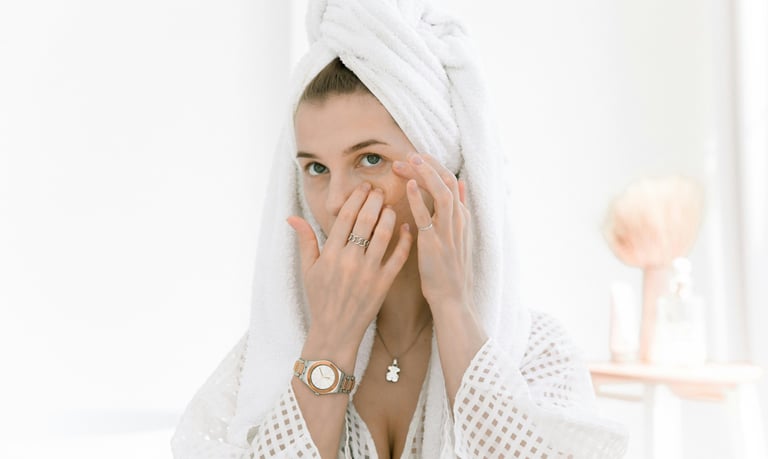Preventing Wrinkles: What To Do Before Fine Lines Begin
BEAUTYSKINCARE


The formation of fine lines and wrinkles is an inevitable part of aging, but the rate at which they appear can be significantly influenced by daily habits.
They say prevention is better than cure, and when it comes to maintaining smooth, youthful skin, this adage couldn't be more accurate. The formation of fine lines and wrinkles is an inevitable part of aging, but the rate at which they appear can be significantly influenced by daily habits. While some embrace the natural evolution of their skin, others seek to prolong a firm, radiant complexion for as long as possible.
The key to preventing wrinkles before they start is a proactive approach that combines targeted skincare, sun protection, and a lifestyle tailored for skin longevity. Many signs of aging, including loss of elasticity and deep-set lines, stem from environmental factors and lifestyle choices rather than genetics alone. This means that the earlier you adopt smart, skin-preserving habits, the longer you can maintain a smooth, glowing complexion. In this science-backed guide, we’ll explore the strategies for keeping wrinkles at bay, from the best sunscreen to prevent premature aging to the essential daily habits to avoid wrinkles.
Sun protection: your first line of defense
Sun exposure is the number one cause of premature aging, and yet, many people still underestimate its impact. UV rays penetrate deep into the skin, breaking down collagen and elastin, the proteins responsible for keeping your skin firm and plump. Over time, this damage manifests as wrinkles, fine lines, and hyperpigmentation.
To combat this, incorporating a broad-spectrum sunscreen with SPF 30 or higher into your daily routine is non-negotiable. One of the most common dermatologist tips to preventing wrinkles early is applying sunscreen every morning, whether it's sunny or overcast. When deciding on a sunscreen formulations containing zinc oxide or titanium dioxide for physical sun protection, as well as chemical filters like avobenzone and octinoxate for effective UVA/UVB coverage.
Application is just as important as selection. A nickel-sized amount should be applied to the face and neck, with additional layers for prolonged sun exposure. Reapplication every two hours is crucial, especially if you spend extended time outdoors. For added protection, incorporate accessories like wide-brimmed hats and UV-blocking sunglasses, and avoid direct sunlight during peak hours.
Daily skincare routine: building healthy habits
A consistent and well-curated skincare routine is the foundation of wrinkle prevention. The right combination of products can help maintain skin hydration, strengthen the moisture barrier, and fight oxidative stress—three essential factors in preserving youthful skin.
Gentle cleansing and moisturizing
Harsh cleansers can strip the skin of natural oils, leading to dryness and premature aging. Opt for sulfate-free, pH-balanced cleansers that remove impurities without disrupting the skin barrier. Follow up with a hydrating moisturizer containing ingredients like hyaluronic acid, ceramides, and peptides to maintain plumpness and elasticity.
Incorporating antioxidants and other preventive ingredients
Antioxidants play a crucial role in neutralizing free radicals—unstable molecules that accelerate skin aging. Vitamin C, niacinamide, and green tea extract are among the most effective options for defending against environmental damage. Meanwhile, formulations containing retinol, peptides, and hyaluronic acid have been clinically proven to reduce wrinkles.
Lifestyle factors beyond topical treatments
Your skincare routine is only part of the equation. Diet, hydration, and overall lifestyle habits play a pivotal role in preventing premature wrinkles.
How diet affects skin aging
A nutrient-rich diet packed with antioxidants, healthy fats, and collagen-boosting foods can significantly impact skin longevity. Omega-3 fatty acids, found in salmon, walnuts, and flaxseeds help maintain skin elasticity while vitamin C-rich foods such as berries and citrus fruits promote collagen synthesis.
The role of sleep in skin health
Ever heard of beauty sleep? It’s not a myth. The body repairs itself during deep sleep, producing growth hormones essential for skin renewal. Chronic sleep deprivation can lead to increased cortisol levels, breaking down collagen and leading to premature wrinkles.
How smoking and drinking too much affects your skin
Both smoking and alcohol disrupt the production of collagen, leading to dull, sagging skin. Smoking restricts blood flow to the skin, depriving it of oxygen and nutrients, while excessive alcohol consumption dehydrates the skin, making wrinkles more prominent.
When to consult a dermatologist
While a solid skincare routine and healthy lifestyle choices can go a long way, sometimes professional intervention is necessary. A board-certified dermatologist can tailor treatments to your specific skin concerns, helping to prevent deeper wrinkles before they form.
A dermatologist can assess your skin type and concerns, recommending the most effective treatments based on scientific evidence. They may suggest prescription-strength retinoids, chemical peels, or laser treatments to improve skin texture and elasticity.
The key to maintaining youthful skin is a combination of daily skincare, sun protection, and a healthy lifestyle. Small changes, like applying sunscreen religiously, eating antioxidant-rich foods, and staying hydrated, can yield remarkable long-term results. By adopting science-backed strategies and seeking professional advice, you can preserve your skin’s vitality and enjoy a radiant, wrinkle-free complexion for years to come.
